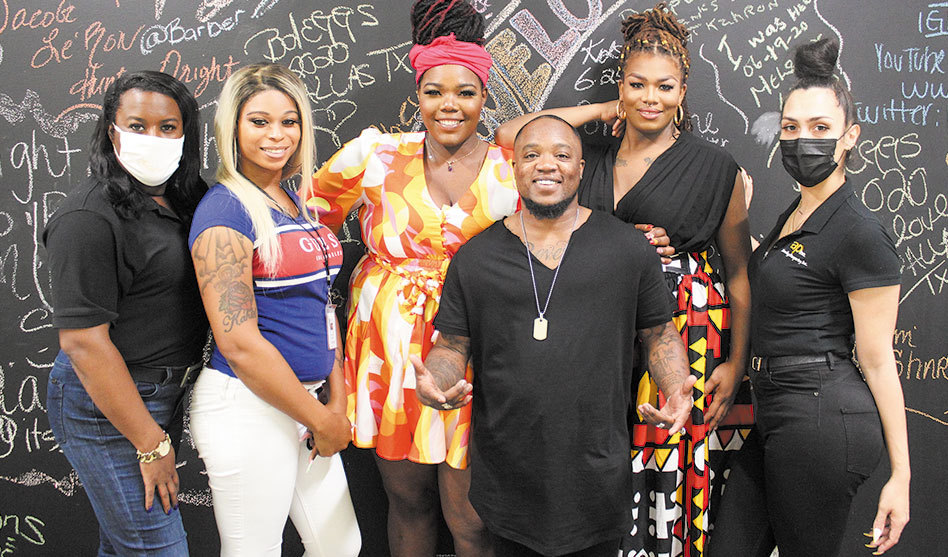Managers and participants in Abounding Prosperity Inc.’s Transparency program include, from left, Naomi Green, Chevell Gee, Kellie Durhal, Shawn White, Zimora Evans and Gia Reyes.
Social media campaign shines light on trans women of color
Rich Lopez | Contributing Writer
richlopezwrites@gmail.com
Transparency, a program of Abounding Prosperity Inc., is in the middle of a campaign that is working to dispel myths about transgenderism in Black and Latinx communities by getting people to “face the facts.” The campaign launched March 31, on International Transgender Day of Visibility, and runs through April 18, the National Transgender HIV Testing Day.
Program Manager Naomi Green describes both the program and the campaign as a way to uplift and empower the trans community and battle the stigma surrounding transgender women.
“Transparency is a holistic program that was developed out of a need to address the socioeconomic and health gaps that exist for Black and Latinx trans women,” she explained.
Abounding Prosperity launched Transparency in 2019 , creating it out of necessity, based on the rise in violence against trans individuals as well as the general discrimination and stigma. While inclusive of trans men of color, the focus has been primarily on women, who are disproportionately impacted by prejudices.
The idea behind the “Face the Facts” came from the program’s advisory board, and was intentionally bookended by those specific days of recognition. But Clinical Case Manager Gia Reyes was instrumental in having the campaign expanded beyond March 31.
“We didn’t want this to be just one day,” Reyes said. “If you spread it out and see it as a constant thing on social media, eventually someone will click on it. An ally on the board said that if we do it on a regular basis, that starts to humanize us for people.
“It’s about not just having it on these ‘special days,’ but all the time.”
The campaign — often hashtaged #FaceTheFacts #StopStigma #TransLivesMatter — can be found on Instagram, Facebook and Twitter at @aboundingprosperity. Posts are crafted to dispel common myths about the transgender community, such as “All trans people are sex workers,” and “All trans women have HIV.” The posts then replace the myths with facts about transgender lives, often accompanied by photos of program participants.
The campaign works to shine a light on the stigma that can be so damaging for transgender people. One “fact” post states: “Stigma makes it harder for trans people to live. Stigma puts trans lives at higher risk for HIV.”
The campaign also features videos by various program participants, including Kellie Durhal for whom Transparency is a haven. “I had known Naomi [Green] for a while. I’m from Detroit. I was looking for a way to feel like part of the community and meet new girls,” she said. “Plus, I could navigate easier for services I couldn’t get there.”
Transparency works with local trans women of color on leadership and professional development, financial literacy, resume building, counseling and more. As the case manager, Reyes helps those who need it find hormone therapy, doctor/patient communication and even housing assistance.
“These are key components to the lives of transgender women,” Green said.
Those services also include direction on name changes and gender marker changes, things that aren’t easy to come by.
“Our names mean a lot to us so it’s important to get that changed,” participant and trans advocate Zimora Evans said. “We want to be addressed as we look.”
Evans’ video will be the last to be posted. It will go online on April 17. Evans also helped Green, Reyes and program assistant Chevell Gee with getting the program up and running.
“I used to work here, and I was in the beginning stages of all this. Let me just say, we were stressed,” she said.
Transparency has also been a safe space for Shawn White, a trans man who has found respite with his sisters at the program.
“First and foremost, Transparency has mentally and emotionally helped my confidence,” White said. “I feel at home with my sisters here. I can get counseling whenever I choose, and they help me stay on top of my health.”
Gee, who both works at Abounding Prosperity and participates in the Transparency program, echoed that sentiment. “The program has helped me to step outside of my box,” she said. “I mean. I’m still stepping, but now I’m a little outside my box.”
In a roundtable discussion for this piece, program participants discussed the challenges they face as trans people of color, but they also spoke of the cultural discrimination within their Black and Latinx families. Yet, with the social campaign where participants have revealed their stories on video, feedback has been positive.
“I had an amazing response,” Durhal said. “I’m showing my vulnerability. People have been touched. That’s reassuring to me that I’m doing the right thing and makes me wanna do more.”
These discussions aren’t new for the group, which hosts a virtual meeting called Chat ‘n’ Chews.
“We come together and share these stories,” Green said.
Although the campaign ends next week, Green and Reyes remind everyone that they are here for the trans community always. Currently, the program serves 34 but is open to new participants who need any or all of Transparency’s services.
“If you just want to be part of this family and need someone to talk to, that is here,” Green said.
As with any nonprofit, funding and volunteers are always needed. But Transparency also encourages organizations, places of employment and those with any kind of sway to create spaces for trans people, especially Black and Latinx trans women.
“Oftentimes, it’s us who have been left behind for so long,” she said.
For more information about Transparency or to donate or volunteer, visit AboundingProsperity.org.













